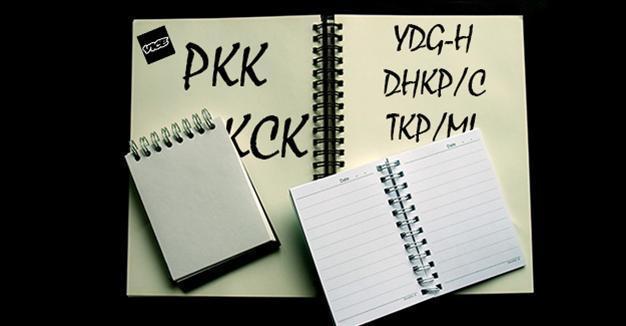British journalists arrested ‘for listing PKK affiliates in a notebook’: Anadolu Agency
DİYARBAKIR

This representational image lists the names of organizations mentioned in the Anadolu Agency report
The abbreviations and English translations of organizations linked to the outlawed Kurdistan Workers’ Party (PKK) written in a notebook has been mentioned among the evidence seized by the police in the arrest of two British journalists working for VICE News, according to Turkey’s state-run Anadolu Agency.
Jake Hanrahan and Philip Pendlebury, as well as their Iraqi translator Mohammed Ismael Rasool, were arrested by a court in the southeastern province of Diyarbakır on Aug. 31.
Although the Aug. 27 tipoff that led to the Aug. 28 detention of the two journalists claimed they had helped the Islamic State of Iraq and the Levant (ISIL) group, the court issued the ruling for their arrest on suspicion they had supported the PKK in the southeastern Mardin, Şırnak and Diyarbakır provinces.
The case has sown confusion, as Turkish media reported authorities interrogated Hanrahan and Pendlebury, asking them questions about possible links to both ISIL and the PKK, two outlawed organizations which are currently fighting each other.
“As the prosecutor’s investigation deepened in line with testimonies and seized evidence, the opinion that the three journalists were in a relationship with the PKK has gained weight,” the agency reported on Sept. 1.
The 700-word Anadolu Agency story also listed the evidence. “A notebook in which the abbreviations and English translations of the PKK/KCK [Kurdish Communities Union] terror organization’s affiliated entities was found in the hotel room that the journalists were staying in,” the agency said.
Journalists say they were doing journalism
Other evidence included, according to the report, footage filmed by the journalists, showing the militants of the PKK’s youth wing, the Patriotic Revolutionary Youth Movement (YDG-H), preparing Molotov cocktails and homemade explosives.
While speaking to the prosecutor, the journalists repeated their testimonies given to the police, pleading not guilty. As a reporter, Hanrahan said, he had to know the names of the organizations, their leaders and goals to prepare a news story.
Pendlebury, too, stressed in his testimony that he was a journalist and a war correspondent, to explain to the prosecutor why he filmed the masked militants in the streets, adding he didn’t know to which group they belonged.
As the investigation into the encrypted parts of the journalists’ hard disks continued, the court decided to arrest the three for “helping an armed organization intentionally albeit without being in its hierarchy.”
